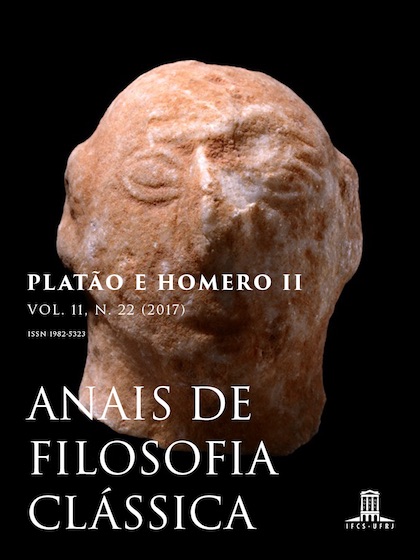L’autorité d’Homère et de la tradition dans le Phédon
DOI :
https://doi.org/10.47661/afcl.v11i22.22937Mots-clés :
Platon, Homère, Phédon, dialectique, tradition poétiqueRésumé
La question de l’âme chez Platon est inséparable de celle du rapport que celui-ci entretient avec la tradition qui le précède, notamment la tradition homérique. La question de ce rapport est vaste et délicate car la stratégie de Socrate personnage (et de Platon auteur) est ambivalente et son emploi des références homériques souvent ironique ou rhétorique. Cette brève étude vise à contribuer à un problème philosophique de fond, pour ne pas dire d’arrière-fond, souvent négligé : si la philosophie se distingue de la tradition (poétique) notamment par la tâche de rendre raison de ses affirmations, c’est-à-dire de les fonder en raison, sur quelle base s’appuie, selon Platon, cette ambitieuse entreprise ?Références
BRANDWOOD, L. (1976). A Word Index To Plato. Leeds, W. S. Maney & Son.
BRISSON, L. (1982). Platon, les mots et les choses. Paris, Maspero.
BRISSON, L. (2008) (dir). Platon. Œuvres complètes (divers traducteurs). Paris, Flammarion.
BURNET, J. (1900-1907) (ed). Platon. Platonis opera, 5 tomes. Oxford, Oxford University Press.
BURNET, J. (1916). The Socratic doctrine of the soul. Proceedings of the British Academy 7, pp.235-259.
DIXSAUT, M. (1991). Platon. Phédon (traduction, introduction et notes). Paris, GF-Flammarion.
ERLER, M. (2001). Legitimation und Projektion. Die ‘Weisheit der Alten’ im Platonismus der Spätantike. In: Kuhn, D.; STAHL, H. (eds). Die Gegenwart des Altertums. Heidelberg. Forum, pp.313-326.
HACKFORTH, R. (1955). Plato’s Phaedo. Translated with Introduction and Commentary. Cambridge, Cambridge University Press.
HADOT, P. (1989). Literarische Formen der Philosophie. In: GRÜNDER, K.; RITTER, J. (eds). Historisches Wörterbuch der Philosophie, Bd. 7. Bâle. Schwabe, pp.848-858.
HALLIWELL, F.S. (2000). The Subjection of Muthos to Logos : Plato’s Citations of the Poets. Classical Quarterly 50, nº 1, pp.94-112.
HOBBS, A. (2000). Plato and the Hero: Courage, Manliness and the Impersonal Good. Cambridge, Cambridge University Press.
HUNTER, R. (2012). “Homer and Plato”. In: Hunter, R. (ed.) Plato and the traditions of ancient literature: The silent stream. Cambridge. Cambridge University Press, pp.38-108.
LABARBE, J. (1949). L’Homère de Platon. Liège, Faculté de Philosophie et Lettres.
LORENZ, H. (2009), “Ancient Theories of Soul”, The Stanford Encyclopedia of Philosophy (Summer 2009 edition), Edward N. Zalta (ed.), Available in: URL= <http://plato.stanford.edu/archives/sum2009/entries/ancient-soul/> Accessed on: 10th, April, 2016.
ROBIN, L. (1950). Platon. Œuvres complètes (traduction et notes). Paris, Gallimard.
ROWE, C. J. (1993). Plato. Phaedo. Cambridge, Cambridge University Press.
ROWE, C.J. (1999). Myth, History, and Dialectic in Plato’s Republic and Timaeus-Critias. In: Buxton, R.G.A. (dir.). From Myth to Reason ? Studies in the Development of Greek Thought, Oxford. Oxford University Press, pp.263-278.
CANTO-SPERBER, M. (1993). Platon. Phédon (traduction, introduction et notes). Paris, GF-Flammarion.
SEDLEY, D. & LONG, A. (2010) (eds). Plato. Meno and Phaedo. Cambridge, Cambridge University Press.
TARRANT, H. (2015). The Phaedo in Numenian Allegorical Interpretation. In: Delcomminette, S.; d’Hoine, P.; Gavray, M.-A. (eds). Ancient Readings of the Phaedo. Leiden. Brill, pp.134-153.
YAMAGATA, N. (2012). Use of Homeric references in Plato and Xenophon. Classical Quarterly 62, nº 1, pp.130-144.


